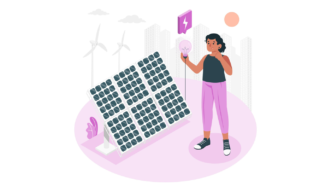LESSON OVERVIEW
The main objectives of this lesson are to:
- discuss various types of youth activism and their impact;
- explore and practise vocabulary to talk about activism;
- watch and discuss a video about a young activist.
In this lesson on youth activism, students discuss quotes from activists, examine causes they represent and practise vocabulary related to activism (e.g. fight for, stand up against, get involved in, etc.). They also create a bio for an activist, evaluate examples of activism, watch and discuss a video about Malala Yousafzai (a young activist from Pakistan) and reflect on the impact of youth involvement in social causes.
B2 / Upper Intermediate60 minStandard LessonUnlimited Plan
WARM-UP AND VOCABULARY
This lesson on youth activism starts with a warm-up in which students complete the definition of youth activism using the words in boxes. After that, students complete quotes by youth activists who advocate for different issues. Then, they match the quotes with causes (e.g. climate justice, animal rights, racial justice, etc.). Students also talk about activists they know and share additional information about them. Afterwards, they practise some vocabulary and choose the best options (e.g. fighting for/standing up against/working against, etc.) to complete sentences about young activists. Students also choose a cause from a list (animal rights, women’s rights or access to healthcare) and create a short bio about an activist.
VIDEO AND DISCUSSION
In this part of this lesson on youth activism, students examine examples of activism (e.g. writing posts on social media, giving speeches, participating in a protest, etc.), identify the ones they’ve encountered or engaged in, and evaluate their effectiveness. After that, they choose a cause (e.g. animal rights, women’s rights, access to healthcare, etc.) and discuss various questions about it. Then, students prepare to watch a video about Malala Yousafzai’s activism. First, they choose the statements that they think are true about her. Next, they watch the beginning of the video and check their ideas. Then, students watch the second part of the video and arrange the events in the correct order. Afterwards, they discuss questions about Malala Yousafzai’s impact, her Nobel Peace Prize, and lessons learned from her activism. Finally, students use phrases from the lesson to respond to points of view on various perspectives on youth involvement in activism.
HOMEWORK/REVISION
This lesson also includes an additional task that you can use as homework or revision. In the task, students complete statements related to social activism using one word in each gap. The task is available in the teacher’s version of the worksheet. You can print it and hand it out to your students. It’s also included in the e-lesson plan.
Subscribe to unlock these and many other Standalone lesson lesson plans with the Unlimited planWORKSHEETS














Such an inspiring lesson! Thank you!
Thank you for your feedback! We’re happy you liked it 🙂